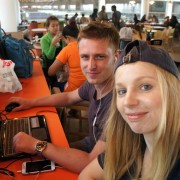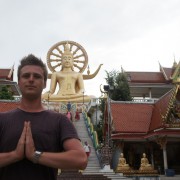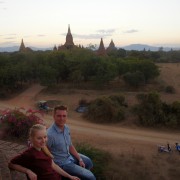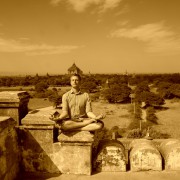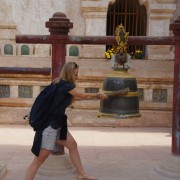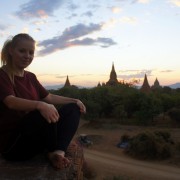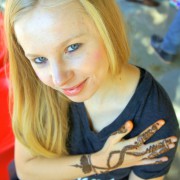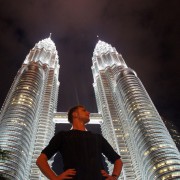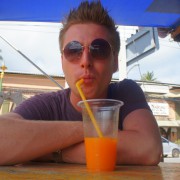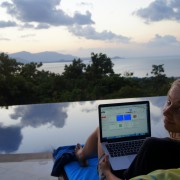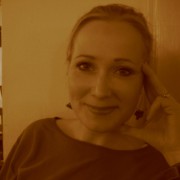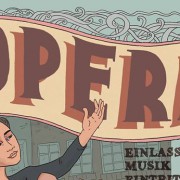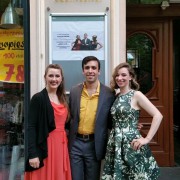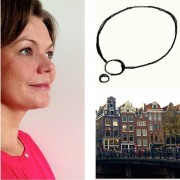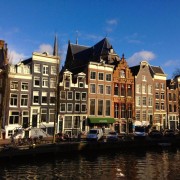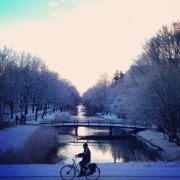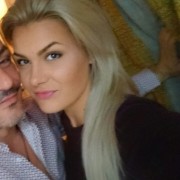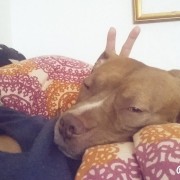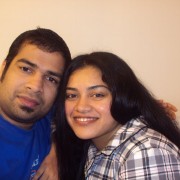eTramping – Meet Agness and Cez With Passion for Travelling
Some people know how to live their life the way they really want to. Mark Twain once said “Travel is fatal to prejudice, bigotry, and narrow-mindedness, and many of our people need it sorely on these accounts. Broad, wholesome, charitable views of men and things cannot be acquired by vegetating in one little corner of the earth all one’s lifetime.”
Meet these two young people from Poland who live their life differently – I loved reading about them (the photos are from Myanmar, Thailand, Kuala Lumpur)
1) Please introduce yourself.
We are Agness and Cez – two friends who have known each other for 7 years and been travelling together for 5 years. Both born and raised in Poland, we never returned to our home country after leaving it at the age of 18 (we lived in the UK for few years first). Small tip from us: never go travelling because you will not go back home promptly, it’s so addictive!
Moreover, we are travel freaks and blogging passionates but you can obviously tell that if you visit Etramping – a travel site where all our secret budget travel tips and hacks are regularly posted. Moreover, we help others discover other cultures, like living and teaching English in China.
We are both independent, creative and above all adventurous. Always stick together and try to make the best out of this life not to be eaten by daily routine.
2) How did you end up in your current cities of all places?
I (Agness) simply fell in love with Amsterdam after visiting the city few times. It’s calm, it’s inspiring, it’s cheerful and creative. I love cycling and sipping on a coffee in cozy and hipster cafeterias so this city seemed to be a perfect match.
Cez is currently living in Dongguan (China) where he teaches English and travels around the country. He loves Chinese cuisine, the language he’s been learning few years now and teaching – good reasons to stay there, right?
3) What is the best and worst about your current city for you…what is a typical day and weekend?
I wish Amsterdam could be less touristic. I often struggle with cycling through Amsterdam Centraal or Dam Square in the afternoon because there are way too many people there. On the other hand, tourists make this city much more interesting and diverse and I like such cultural diversity.
Cez says that he has been so long in Dongguan that he feels a bit like a local. The food is amazing, but the best and most important are the people around. A typical day starts with teaching in a kindergarten, followed by a gym session. Weekends are usually spent in the bar or KTV (a place where groups of friends can rent a room to sing together).
4) How do you find the lifestyle in your cities compared to your hometown in Poland?
We both try to maintain a healthy lifestyle so no matter where we are, we keep ourselves active and busy with different activities and projects. Just to point out few differences, houses in Amsterdam are really cool – often crooked and very narrow. Food is all about sandwich spreads, cheese and more cheese.
The lifestyle in China is incomparable to the life in Europe. You’d have to visit for a bit to get the idea of how different things are: from the food and the way to eat it, through social interactions, to even toilets (basically holes in the floor).
5) How do you make your living now – and how would you like to develop that career?
I’m working full-time at Poki – a cross platform game developer where I’m developing myself as a marketeer, whereas Cez is teaching English in Dongguan part-time. Apart from that we are also generating some income from Etramping and it helps cover our travel expenses. Among other things, Etramping now offera cheap flights, cheap hotels and even travel insurance.
Right now our biggest project is ESL job board for China where travellers from around the world can find a great opportunity of well-paid job combined with a cultural experience.
6) Do you see the differences between nationalities easily – yours vs. Americans vs. other Europeans?
Definitely. Poles are more competitive and complain a lot about everything, starting from their current jobs, financial situations to relationship statuses and politics. On the other hand though, we’re very hard-working people who you can rely on and work with smoothly. We drink vodka much more and have more hangovers – but that seems so obvious!
7) What do you absolutely miss from your country/elsewhere heritage (food, culture, movies etc) …or elsewhere?
Although I miss my mom and my best friends the most, I can’t forget about mentioning Polish cuisine here that I have a very good relationship with. I’m a typical foodie who likes to dig into fatty dishes prepared by my grandmother in a very traditional way. Just to name few of my favourite: chicken soup filled with fresh veggies and served with long thick homemade pasta, Hunter’s strew made from shreds sauerkraut, cabbage and dried mushrooms and of course Polish dumpling called pierogi filled with meat, sauerkraut and mushrooms, seasonal fruits (I love strawberry and blueberry ones) and cottage cheese and boiled potatoes.
8) Workwise – how do you see Dutch/Chinese being different from your countrymen– also culturally, what stands out in your chosen profession?
Flexibility at work is something that is very rare in Poland.
You have to strictly follow certain working hours, typically 9-5, and being late is seen as something bad. Our current jobs allow us to be very flexible thus we can develop our careers as marketeers and teachers while exploring the world and writing about it.
9) Knowing more about life and having lived with your decisions for a while (like work) – would you still choose to be there and why? Why not..
We don’t regret things and never make ourselves do something we don’t like or enjoy.
Every decision that is made, whether it’s about blogging, travelling, career or relationships, is based on what we want, desire and aim for. Thus we’re happy and fulfilled people who would not change a thing!
10) What should everyone know and understand about Poland and its culture?
Poland is a very traditional and religious country where food and family play an important role. Our culture is closely connected with its intricate thousand-year history. We are also very patriotic, hospital and sociable. Come to Poland and you will be warmly welcomed with vodka, good fat food and plenty of Poles willing to share interesting stories with you!
11) What cafes or restaurants do you recommend to tourists to go to in “CURRENT CITY” and why? Or to do something else.
My favourite cafeteria is called Bagels & Beans where the best healthy lunches are served and coffee tastes like heaven. I also enjoy SLA restaurant with salads and homemade soups and often visit Lite Dark for powerful smoothies. All places can be found here.
Cez lives in Dalang district of Dongguan and he strongly recommends Shangralila restaurant. There are 3 branches in that district alone, while there was only one when he came to Dalang first time 4 years ago. It says something about the taste of the food!
12) What would be your ideal life – with no monetary issues to make it happen!
If we could we would be on the road all the time going from one city to another, talking to locals, taking pictures and blogging about it. This planet has so much to offer for budget travel freaks as us!
13) Would you move back to Poland full-time – yes or no (why and why not)?
Not at the moment. We enjoy our lives in such creative and inspiring countries like the Netherlands and China. We spent over 17 years in Poland so let us see what other countries have to offer!
How to connect with you two:
Facebook:https://www.facebook.com/etramping/
Website: http://etramping.com/
Twitter: Agness https://twitter.com/Agnesstramp ; Cez https://twitter.com/cezkrol/
Instagram: https://www.instagram.com/runagnessrun/ and https://www.instagram.com/etramping/

